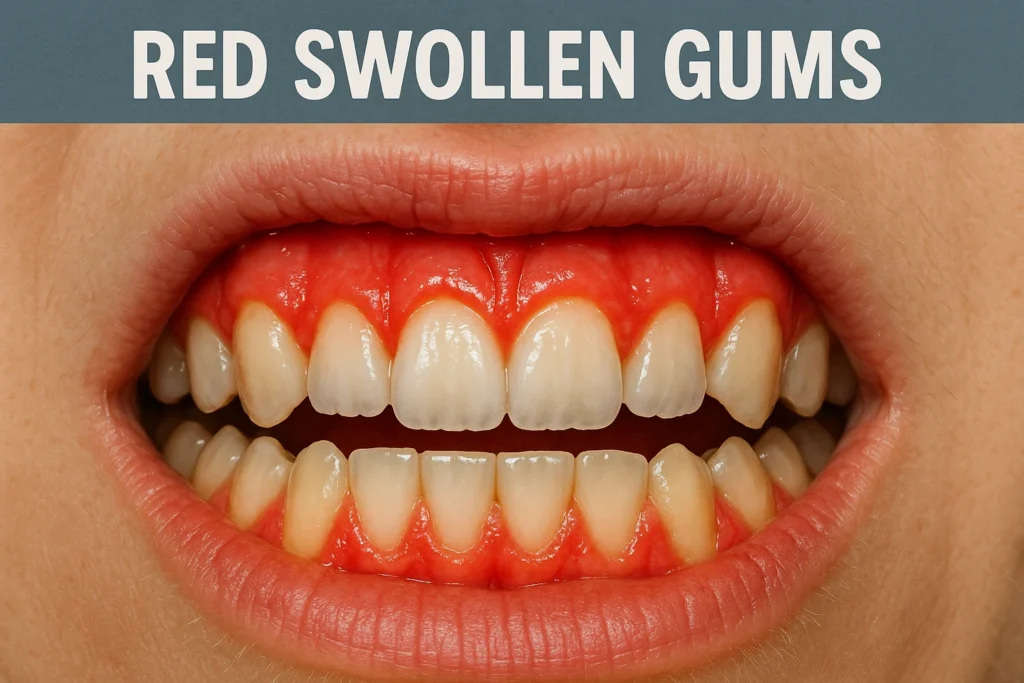Gum disease doesn’t start with pain, it starts silently. By the time your gums bleed, swell, or recede, damage may already be underway. Knowing the early gum disease signs is the first step in preventing permanent tooth loss, bone damage, and systemic health complications.
In this blog, we’ll help you identify the red flags early, understand their causes, and show you exactly what to do next to restore your gum health.
🔍 What Are the Early Gum Disease Signs?
Here are the most common warning signals your gums send when something’s wrong:
- Bleeding gums while brushing or flossing
Red or tender gums that are sensitive to touch - Swollen gums around specific teeth
- Persistent bad breath or metallic taste
- Gum recession your teeth look longer
- Loose teeth or change in bite
- Gingivitis early signs, like mild inflammation or slight bleeding
If you spot one or more of these, you’re likely in the first phase of gum disease: gingivitis and it’s fully reversible at this stage.
Bleeding Gums Causes: Why It Happens
Bleeding gums aren’t “normal,” no matter how common they may seem. They often point to:
- Plaque and tartar buildup irritating gum tissues
- Improper brushing technique or hard bristles
- Hormonal changes (pregnancy, puberty, menopause)
- Nutritional deficiencies (especially Vitamin C)
- Early periodontal disease symptoms
Ignoring bleeding gums can allow the infection to spread deeper leading to periodontitis, the advanced form of gum disease.
Red or Tender Gums: Minor Irritation or Major Sign?
Red or tender gums may indicate mild irritation or the beginning of something more serious. Don’t brush it off (literally). When redness is localized or consistent, it’s often linked to plaque retention, bacterial infection, or the start of tissue breakdown.
Bad Breath and Gum Issues: A Strong Connection
Persistent bad breath (halitosis) is often a result of bad breath and gum issues, not just food or poor brushing. Bacteria hiding in gum pockets release foul-smelling sulfur compounds, which brushing alone won’t fix.
If your breath stays bad after brushing and flossing, it’s time to get your gums checked.
Gum Recession Prevention: Catch It Early
Gum recession prevention starts by treating gingivitis before it becomes periodontitis.
What Causes Gum Recession?
- Aggressive brushing
- Plaque accumulation
- Smoking or tobacco use
- Grinding/clenching teeth
- Genetics
As gums pull away from the teeth, they expose roots causing sensitivity and vulnerability to decay. Early intervention is key.
Swollen Gums Treatment: What Can Be Done?
Swollen gums mean your body is responding to an irritant usually bacterial plaque.
Effective Treatments:
- Professional cleaning to remove plaque and tartar.
- Antibacterial mouthwash or gels.
- Improved home care and soft brushing.
- Laser-assisted gum therapy for deeper infections.
For early-stage gingivitis, these steps are often enough to reverse the condition.
Home Remedies for Gum Problems
While professional care is essential, these home remedies for gum problems can offer relief:
- Saltwater rinses (1 tsp salt in warm water, twice daily)
- Clove oil for its natural anti-inflammatory properties
- Hydrogen peroxide rinse (diluted with equal parts water, once a week)
- Oil pulling with coconut oil
- Cold compress for swollen or tender spots
These should supplement not replace clinical treatment.
Gingivitis vs. Periodontitis: A Quick Comparison
| Symptom | Gingivitis (Early) | Periodontitis (Advanced) |
| Bleeding while brushing | Yes | Yes |
| Gum swelling or redness | Mild | Moderate to severe |
| Bad breath | Occasionally | Persistent |
| Gum recession | Rare | Common |
| Tooth mobility | No | Often |
Oral Care for Gum Health: Daily Habits That Matter
Prevention begins at home. Daily oral care for gum health includes:
- Brushing twice daily with soft-bristled toothbrush
- Flossing once a day to remove plaque between teeth
- Using mouthwash to kill bacteria in hard-to-reach places
- Replacing your toothbrush every 3 months
- Regular dental checkups every 6 months
What to Do If You Notice Symptoms
- Don’t delay book a dental appointment immediately.
- Start gentle brushing and flossing to reduce bacterial load.
- Switch to a gum-care toothpaste with anti-inflammatory properties.
- Avoid smoking, sugary foods, and acidic drinks.
- Follow professional advice and complete any recommended treatments like scaling, root planing, or laser therapy.
Take Control of Your Gum Health Before It’s Too Late
Gum disease is 100% preventable and in its early stages, completely reversible. The key is timely action. At Summirow Dental Hospital, we specialize in early detection, minimally invasive gum care, and long-term periodontal health.
👉 Book Your Appointment: Call us at +91 93777 77303
👉 Join Our WhatsApp Community: https://whatsapp.com/channel/0029Va6XSfL4NVikAhFkEU07
👉 Visit Our Website: www.summirow.com



